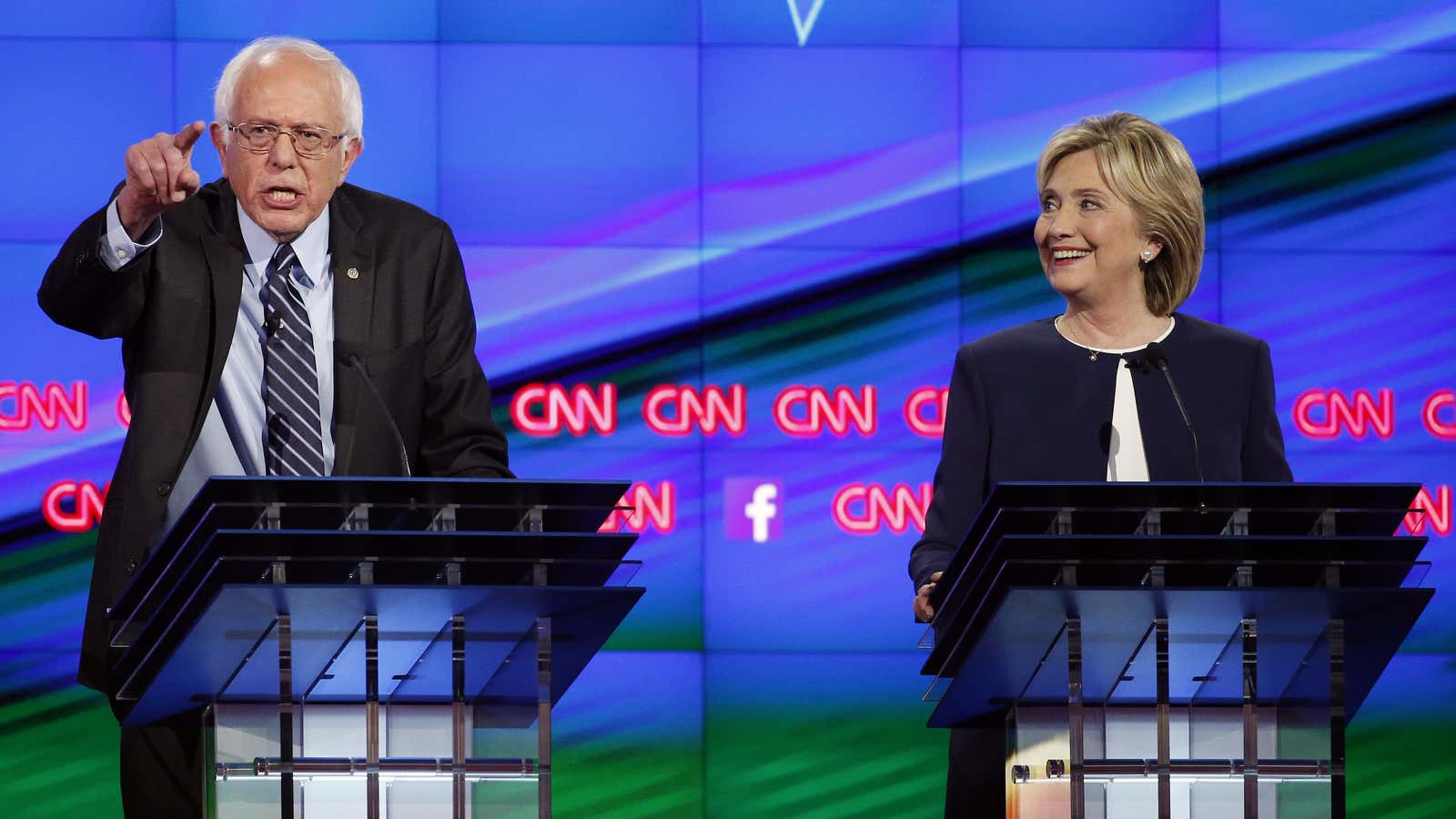The first Democratic debate, which aired on Oct. 13, was a relatively civilized affair. The candidates were generally congenial, stuck to discussing policy, and even made a conscious point of avoiding personal attacks.
The ensuing commentary, however, has been decidedly less civilized. As with most televised presidential debates, deciding who “won” is always an incredibly important—if totally irrelevant—discussion that begins almost immediately after the candidates stop speaking. In this case, the media appear to be in overall agreement: Tuesday night went to former secretary of state Hillary Rodham Clinton, with senator Bernie Sanders of Vermont following closely behind.
Despite the fact that these are obviously subjective assessments, Bernie Sanders’s most vocal supporters—mainly educated, politically leftist white men—have lost their collective minds over what they see as an media-led plot to bring Bernie down.
“Tuesday night’s Democratic debate had hardly been over 24 hours before an alarming conspiracy theory began to form,” writes Amanda Marcotte for Salon; “that the media is in cahoots with the Clinton campaign to cover up the ‘fact’ that Bernie Sanders won the debate.” She cites a Change.org petition compiled by Sanders supporters (charmingly titled “CNN is CORRUPT”), that accuses “CNN, Time Warner, and ‘SuperPACs’ of somehow conspiring to cover up the truth.”
Marcotte’s piece follows in the wake of two pro-Sanders essays, one by writer and academic Fredrik DeBoer, and another by AlterNet associate editor Adam Johnson. DeBoer bases his argument—that Hillary didn’t genuinely “win” the debate—on a rather simplistic reading of Mark Leibovich’s book This Town, a portrait of Washington’s intermingling political and media classes. Citing this infamous Washington-insider culture, he claims that the entirety of mainstream political media is trading positive Clinton coverage for insider access down the line. Johnson, who cites “relatively objective” online polls and focus groups as proof of Sanders’s debate-night victory, similarly accuses “establishment journalists” of forcibly manipulating reality to serve their own pro-Hillary inclinations. This, despite his own admission that such polls and focus groups are far from scientific; and despite the arguable fact that the “establishment media” has been far tougher on Hillary than Bernie or any other fractionally viable Democratic candidate in the race. (Update: Both DeBoer and Johnson tell Quartz they are not personally supporters of Sanders.)
The post-debate energy among anti-Hillary elements in the media and Sanders supporters alike aptly reflects Sanders’s performance on stage. He was loud (and not always in a good way). He was angry (sometimes in a good way). At times, it didn’t feel as though he were persuading audience members to vote for him—more that he was berating them for seriously considering any other candidate. He did everything short of bellow “WAKE UP, AMERICA!” into the mic.
Bernie has a well-documented anger problem. But this type of aggression is alienating—which is unfortunate, because Sanders is certainly worth listening to on issues like Big Pharma and Wall Street. (Not so much on gun control, foreign policy, or immigration.) But style can sometimes override substance. That’s the sad reality of American political theater.
In his defense, supporters squawk something along the lines of “but America is angry!” This is absolutely true. But there hasn’t been an election cycle since Nixon at which time Americans haven’t made ballot-box decisions based on being “sick and tired” of something or other. Frustration turns the political wheel. And Sanders’s supporters aren’t merely frustrated with America’s problems—they appear to be angry at Americans themselves.
Perhaps it’s a justifiable anger; but frankly, much of America is pretty “sick and tired” of being yelled at and ordered around by angry white men—on either end of the political spectrum. And building a campaign led and championed by flustered, shouting white guys is not good brand management in 2015. For one, it doubles down on this (incorrect) notion of Bernie Sanders as a cooky, red-faced Vermont hippy, glasses askew. But it also highlights a troubling habit of educated, left-minded young men: to condescend when they should be consensus-building, and belittle when they should be listening. These types seem to think they’re the only ones who truly know what’s best for this country. Don’t agree? Well you’re just a big idiot.
Case in point: When Black Lives Matter activists disrupted a Bernie Sanders rally in Seattle late this summer, Gawker’s Hamilton Nolan wrote a controversial essay discussing the “wisdom” of BLM protesters (repeatedly) “driving Sanders from the stage.”
“It is stupid, don’t do it,” Nolan wrote. “Do you want someone who will do the things that will actually address the issues you care about? Or do you want to be pandered to better? … Go shout at someone who deserves it.”
This so perfectly encapsulates the petulant dismissiveness at the core of some pro-Sanders progressivism.
Bernie lost his cool a bit on Tuesday night. And if he wants to put his politics to practice at the executive level, he’s got to figure out a way to get it back. If he can’t, his camp has to devise a strategy for repositioning or reigning in his more abrasive fans. For their part, Bernie’s supporters have two options: chill out, or get out of the way.
